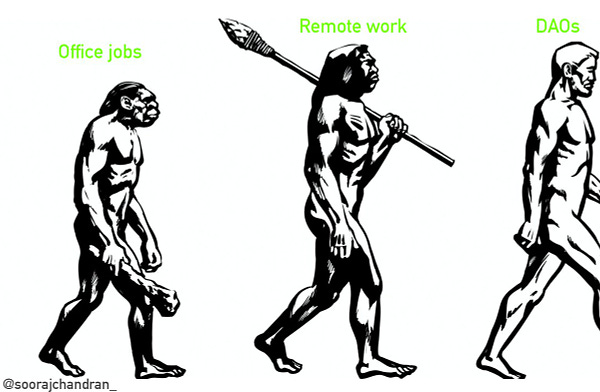Brief past and wild future of office jobs
In this edition, we try to explore the future of work weeks, how the power is shifting to employees, how DAOs will impact the career paths and create work metaverses.
First of all, a Happy New Year to you! The past two years saw the biggest work-lifestyle shift humans had to go through. Nobody knows what lies ahead. What does the future look like?
Predictions about future trends are almost always wrong. Nobody knew covid would happen. But that shouldn’t stop us from making guesses. And more importantly, working towards those dreams.
Any future in which more people can improve the quality of their lives sustainably is a good one. This passage, narrated by Steve Jobs from the Apple ad summarises it well.
"Here's to the crazy ones, the misfits, the rebels, the troublemakers, the round pegs in the square holes ... the ones who see things differently -- they're not fond of rules, and they have no respect for the status quo. ... You can quote them, disagree with them, glorify or vilify them, but the only thing you can't do is ignore them because they change things. ... They push the human race forward, and while some may see them as the crazy ones, we see genius, because the people who are crazy enough to think that they can change the world, are the ones who do."
Enough of Steve Jobs. Let’s talk about office jobs.
In this edition, we try to explore the future of work weeks, how the power is shifting to employees, how DAOs will impact the career paths, work metaverses etc.
The brief past
Office jobs have only been around for a while. Even the idea of people working for an organisation that pays their wages is not very old.
Dutch East India Company is the world’s first multinational company. Although their mode of expansion was colonialism. Big corporations only became mainstream in the past century. That’s a brief period in human evolution.
The rise of office jobs
The 1970s and 80s gave birth to what we know today as office jobs. What we call 9-5 came into being, with big tech corps like Apple, Intel, IBM. People started talking about work-life balance, and the size of the offices became a measurement of success.
Dawn of outsourcing
Through the 90s and early 2000s, India became the back office of a lot of US companies. Cheap labour and easy availability of human resources led to an explosion in outsourcing. Indian multinational companies like Infosys and TCS ruled the outsourcing world. India became a booming IT industry.
The 2010s: Faster internet and communication tools.
With the advent of faster internet and communication tools like Skype, people realised they don’t need to go to offices to work. Remote work slowly became popular among early adopters. Remote work became a cult.
Over the decade, more people adopted flexible and completely remote ways of working.
Covid 💥
You know what happened here.
The wild future
One of my strong cases for the existence of the workplace was building relationships. But I think this is a generational problem. Building online relationships will be easier for a generation born into social media. We are already seeing examples of this.
Discord groups are breeding grounds for the next generation of companies and communities. Finding your tribe is easier when you can meet like-minded people online and bring them into your real life.
In a traditional world - you have to work with the limited options given to you. It is hard to find your tribe.
With plenty of ways to build relationships outside of work, the strong case for the existence of office spaces will cease to exist.
So what would “office jobs” of the future look like? Should we even call them office jobs? One better term to use is knowledge workers. We trade our knowledge or skills for an incentive - usually a monetary incentive.
Software engineers, product managers, marketers, salespeople - all of them fall into this category.
Work from anywhere. Anytime.
Humankind is now used to designing life and days around work. It will change. More async jobs - time and location agnostic - will exist. You will be able to design your days as you want and fit work into them.
But there is a problem with the “work from anywhere” part. Most of the human population needs visas to travel. But this is changing too.
With more digital nomad visas and easing immigration rules, it will become easier for people to move around the world.
More power to employees. Aligned by purpose.
More tech companies exist today than ever before. If you have the right skills, you have the power to choose. Instead of finding a random job that pays your bill, people would go after companies that gives them a higher purpose and amazing benefits.
While good pay is a necessary factor in attracting top talent, it won’t be sufficient. Companies that can focus on impact and align their teams under a mission will hire and retain great talent.
The benefits provided to employees will skyrocket. Premium benefits of today will be the norm in the future.
Redefining the idea of the workweek
People will want something costlier than money - time. 4 day work weeks, flexible work hours etc are going to be the norm in the few years in top companies.
UAE recently adopted a 4.5 day work week. Several companies like Bolt are experimenting with 4 day work week.
Even the idea of “work week” will be blurred. Software and apps don’t need to rest. Only people do. And people can rest when they want to - not following an arbitrary standard set by the industrial age.
More freelancers working multiple jobs
Employment laws in most countries were designed for physical labour and the industrial age. This will change drastically.
4 million employees are leaving their jobs every month in the US. In Germany, 6% of the workers are leaving jobs. Covid helped people put things into perspective. People will be pulled towards a better life, career opportunities or becoming self-employed.
The idea of working and dedicating your life to a company will be outdated. People will work multiple jobs at the same time on an hourly basis.
People who specialise in a skill will sell the same skill to different companies.
I wrote about the “skill unbundling” in detail.
Code is the law: DAOs
You can’t write about the future of work without mentioning DAOs.
If you are not familiar with DAOs, this guide from The Generalist is the most comprehensive one I’ve found so far on the internet.
DAOs help people align under a shared mission. It also incentivises people with ownership in the form of tokens.
Gamified career paths
Job titles have always been arbitrary. I’ve seen senior engineers with 3-15 years of experience. Job titles could be gamified in the future of work.
Human involvement and emotions in a company make jobs titles uncertain. Workplace politics can make or break your career.
But, when the code is law, a manager won’t be the decision-maker regarding your promotion or a pay raise. Rules set by the DAOs will measure the work.
The code will decide your growth - Achieve X to unlock Y. It could work like playing a game. Imagine career growth as a function - you achieve certain goals and there is nothing a micromanaging human can do to stop your growth.
Technology will make it possible to compensate each person according to their economic value. That’s pretty bad news for most people, and very good news for some.
The above is an excerpt from the post, NFTs and future of work by Dror Poleg. Good work will be rewarded by the code. People pleasers and politicians at work will have a hard time. Your race, location and gender will not determine your career growth.
Anonymity, privacy and work metaverse
Future employees will be faceless entities. Or even better, a virtual name and face.
The legal aspect of work hasn’t changed much in the past few decades. You are either a contractor or a full-time employee. You have to provide a set of documents and go through background checks to be employed in a company. There is no privacy.
Blockchain-based resumes can solve this. In a traditional world, the employer needs to trust whatever is written in the resume or talk to a reference to get it verified. This can also be gamed.
With blockchain-based resumes, work history and experience can be stored and validated. You won’t have to provide your personal information. Such a resume screening process will have no racial or gender bias.
People can have a digital identity separate from their real ones. The digital identity can work for them and will have its resume. Workplaces of the future will be composed of such digital entities. That would give rise to work metaverse.
Drop into any recent Web3 discord communities, and you can already see a glimpse of this. Actually, we are already in it.
VR workspaces and faster internet
Many of us thought of VR as a fad. But Oculus was the top app on the Apple app store last Christmas. Could it mean anything?
VR is still in its early stage. With the likes of Apple Glass and other wearable devices, you won’t need to carry a computer to work.
Internet-based IDEs for developers like Github codespaces and Replit also add to the idea of work from any device.
We are still dependent on mobile networks or modems to access the internet. Internet speed and communication tools accelerated the pace of this office jobs revolution. This wouldn’t be possible with slow dial-up internets. But the future is even brighter.
Once we are able to access fast internet from anywhere, cities as we know it will change.
The future is wild. Of course, there are a lot of challenges to everything mentioned here - like any other new idea. Time and smart people will solve it. If you can dream it, you can do it. If you liked what you read, please spread the word.
In the future editions, I’ll explore each of these wild sub-topics including work metaverse, future of work weeks, gamified career paths etc. in depth. If you liked what you read here subscribe to No Office Required.
How did you like this edition of No Office Required? I put hours of research into every edition of this Newsletter. Your feedback helps me make this great.
Thanks for reading and see you soon with another exciting edition!
Sooraj
Want to discuss remote work? Connect with me on Twitter









